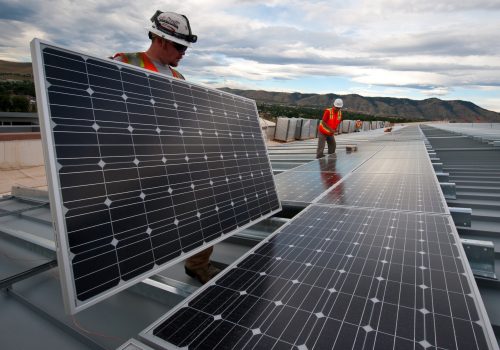On September 8, 2021, the Atlantic Council Global Energy Center hosted a conversation on Article 6, a template for voluntary cooperation through carbon trading as part of the Paris Agreement. H.E. Grace Fu, Singapore’s Minister for Sustainability and the Environment, delivered opening remarks. Following Minister Fu’s remarks, Henrik Hallgrim Eriksen, Chief Climate Negotiator for Norway, Joseph Teo, Chief Negotiator for Climate Change for Singapore, and Molly Peters-Stanley, Climate Negotiator at the US State Department, delivered prepared statements about issues facing negotiations regarding Article 6 at the upcoming 26th Conference of Parties. George Frampton, distinguished senior fellow at the Global Energy Center, moderated the panel.
In Minister Fu’s opening remarks, she noted that Article 6 is the only outstanding article yet to be agreed in the Paris Agreement. The International Emissions Trading Association estimates that an effective carbon market could save up to $250 billion/year in costs for climate action by 2030, and that market opportunities for global emissions trading could reach $800 billion by 2050. Without rules in place this year, though, there will be further delays in revenue for the Adaptation Fund. The Minister noted that “success in Glasgow depends on Article 6 being completed.”
Eriksen continued the discussion by underlining ambition as the keyword from the IPCC’s August report. Balancing emissions and removals is key to increasing ambition, and “that’s where we need to go to search for balance to net zero; not all countries can become net-zero within their own territories.” Negotiations include a framework for non-market-based cooperation which may help advance other forms of cooperation aside from those involving the carbon market. At the same time, he emphasized, it’s vital to get the long-term structures right from the start.
Following this, Teo expounded upon the issues that are keeping Article 6 from being completed. Specifically, these are whether Article 6.2 should contribute to generating revenue for the adaptation fund, issues of double-claiming under Article 6.4, eligibility of pre-2020 carbon credits for post-2020 NDCs, and how Article 6 could support adaptation action through generating finance for added adaptation via Article 6.2. “Compromises may not be found only within specific issues but should be agreed within a broader package where tradeoffs and impacts can be assessed more holistically in the context of the wider work on ambition, transparency, accountability, and support.” Optimistically, he noted that negotiations are not starting from zero and that there is a menu of compromise options that are on the table from the COPs at Katowice and Madrid.
Four key issues exist from the US side, Peters-Stanley explained. These issues are accounting, the extent of Kyoto Protocol certified emissions being counted towards NDCs, the design of the new carbon crediting mechanism, and how cooperation under Article 6 can raise ambition. Although she underscored commitment to supporting climate finance generally and adaptation finance in particular, “it’s an issue that is most effectively addressed in the finance components of a COP26 outcome.” Peters-Stanley warned that there are some good compromise solutions, but others could ultimately be detrimental to achieving climate goals. She also highlighted the importance of designing a new carbon crediting mechanism that captures the lessons learned over the last few decades and avoids well-known pitfalls in the design of the certification system.
During the Q&A, the question of ambition versus stress on the trading system was brought up. Teo laid out, in order of importance, three objectives for Article 6 negotiations – environmental integrity, ambition, and looking at other technical compromise solutions, such as overall mitigation of global emissions. In response to a question about sector-based deep decarbonization trading, Eriksen stated “It will be up to the market to have demand and generate cooperation through different sectors through government and also the private sector.” Article 6 is inclusive, he noted, stating that sectors are taken into account without explicitly being a part of the negotiations. As for implications for REDD+ credits, Eriksen pointed out that there is a relationship as far as climate finance is concerned, and that some of the approaches that are particular to REDD+ may be used without transfer of NDC goals, but that these solutions are primarily at the country level.
This event was part of the “Raising Ambitions: The Road to Glasgow” series.
Agenda
Keynote remarks by
H.E. Grace Fu
Minister for Sustainability and the Environment
The Republic of Singapore
A conversation with
Henrik Hallgrim Eriksen
Chief Climate Negotiator
The Kingdom of Norway
Joseph Teo
Chief Negotiator for Climate Change
The Republic of Singapore
Molly Peters-Stanley
Negotiator
US Department of State
Moderated by
George T. Frampton
Distinguished Senior Fellow
Atlantic Council Global Energy Center
Related content
Associated experts
Learn more about the Global Energy Center

The Global Energy Center develops and promotes pragmatic and nonpartisan policy solutions designed to advance global energy security, enhance economic opportunity, and accelerate pathways to net-zero emissions.




On Twitter? Follow the conversation with @ACGlobalEnergy and @AtlanticCouncil using #ACEnergy